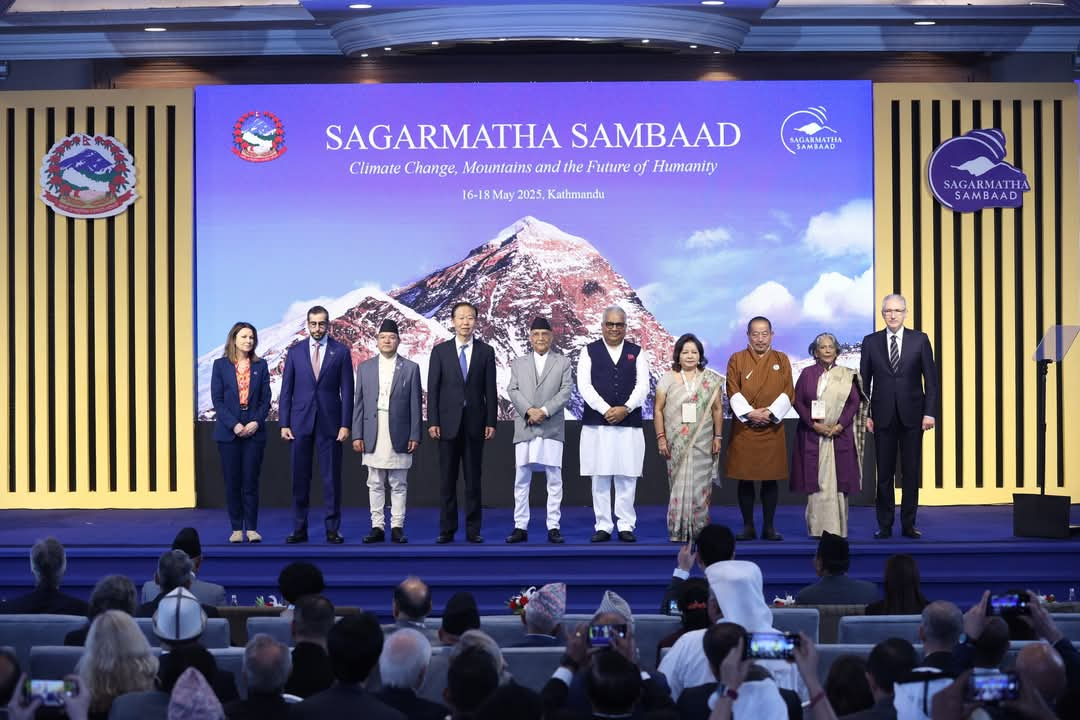MoENR minister attends first edition of Sagarmatha Sambaad in Nepal
The inaugural edition of Sagarmatha Sambad, a landmark multi-stakeholder dialogue forum, opened on 16 May 2025 in Kathmandu, Nepal — bringing together regional and global leaders to confront the most pressing challenges facing our planet. With its first theme centered on “Climate Change, Mountains, and the Future of Humanity,” this historic dialogue places mountain nations like Bhutan at the very heart of the global climate conversation.
As a country cradled in the Himalayas — a region both breathtaking and increasingly vulnerable — Bhutan has proudly committed to be an active voice in this critical exchange. The Kingdom recognizes that the fate of mountain ecosystems is not only a regional concern, but a defining issue for the survival of all humanity.
In a ceremony led by Nepal’s Prime Minister KP Sharma Oli, the three-day summit was formally inaugurated, launching a series of high-level ministerial discussions and parallel sessions. These sessions delve into urgent climate topics including ecosystem services, the “recognise, respect, and reward” approach to natural resource governance, disaster risk reduction, resilience building, and innovative climate and carbon financing mechanisms.
Representing Bhutan, Lyonpo Gem Tshering, Minister for Energy and Natural Resources, joined the summit to reaffirm the country’s commitment to climate action. In his remarks, he lauded Nepal’s timely initiative in convening the dialogue, calling it “a clarion call at a time when the mountains are crying out for help.”
“Just a few decades ago, the terms climate change and global warming were barely known,” the Minister said. “Today, they have become existential threats — not just to low-lying nations or small island states, but to us in the mountains as well. Glaciers are melting, rivers are changing, and ecosystems are shifting before our eyes. The very fabric of our natural heritage is under siege.”
Bhutan, he emphasized, is not standing still in the face of these changes. As a constitutionally carbon-negative nation, Bhutan has enshrined in its Constitution a mandate to maintain at least 60% forest cover at all times — a target the country has not only met but exceeded, with current coverage at 69%. Every policy in Bhutan is grounded in the visionary framework of Gross National Happiness, which puts environmental conservation at the forefront of national development.
“The Himalayas are more than just mountains — they are water towers, biodiversity sanctuaries, and cultural cradles,” Lyonpo Gem declared. “And yet, they are among the first casualties of a warming world. Climate change has everything to do with mountains, and mountains have everything to do with humanity’s survival.”
In a significant step towards building global momentum for a net zero, climate-resilient and nature positive future, four countries, Bhutan, besides Madagascar, Panama, and Suriname was declared as carbon negative country during the 29th Conference of the Parties (COP29) of the United Nations Framework Convention on Climate Change (UNFCCC) in Baku, Azerbaijan.
Being carbon-negative means a country removes more carbon dioxide from the atmosphere than it emits. Bhutan stands as a rare and inspiring example. While it generates approximately 2.2 million tonnes of CO₂ annually, its forests and ecosystems absorb nearly 6 million tonnes — making Bhutan not just carbon-neutral, but significantly carbon-negative.
As the global climate crisis intensifies, the need for ambitious emission reduction targets and sustainable energy strategies has never been greater. Around the world, countries and organizations are striving for carbon neutrality — but Bhutan has already gone beyond.
Since the 1980s, Bhutan has strategically prioritized renewable energy, with a strong focus on hydropower. Harnessing the powerful flows of its Himalayan rivers, the country now generates about 99% of its electricity from hydropower. This clean energy production yields an impressive 10,000 GWh annually — far exceeding domestic demand and enabling exports to neighboring countries.
In addition to reducing its own emissions, Bhutan has implemented progressive policies to support rural communities. The government provides free electricity to remote villages, significantly cutting dependence on firewood and fossil fuels. This initiative alone helps Bhutan avoid approximately 4.5 million tonnes of carbon emissions each year — a contribution that not only protects the environment but also enhances the quality of life for its people.
Bhutan’s model demonstrates that with visionary leadership, environmental stewardship, and bold policy, it is possible not just to fight climate change — but to lead the way.
Sharing to local media on the even of the event by Foreign Minister Arzu Rana Deuba, said that the main theme of the event is “Climate change, mountains and the future of humanity.”
The event’s central theme is “Climate change, mountains and the future of humanity,” with an expected participation of 350 national and international delegations, according to Foreign Minister Arzu Rana Deuba.
The Director General(DG), of International Centre for Integrated Mountain Development,Dr Pema Gyamtsho reiterated to enhance collaboration in maintaining consistency and coherence. “Mountain should not remain just in discourse,” the DG said.
Inspired by global platforms like the World Economic Forum in Davos, the Shangri-La Dialogue in Singapore, and the Raisina Dialogue in New Delhi, the Sagarmatha Sambad was initially announced by the previous Oli government in 2019 but was postponed due to the COVID-19 pandemic.
The dialogue will feature 12 thematic sessions covering critical issues such as limiting global warming to 1.5°C, sustaining mountain economies, addressing loss and damage in island nations, and ensuring gender and intergenerational equity in climate action.
The purpose of the Sagarmatha Sambad is to cultivate a deeper, collective understanding of how climate change is impacting mountain nations — regions that are often overlooked yet bear some of the heaviest burdens of a warming planet. These countries, despite contributing the least to global carbon emissions, face some of the most severe consequences: melting glaciers, unpredictable weather patterns, biodiversity loss, and increased risks of climate-induced disasters such as landslides and floods.
At its core, the event is a call for climate justice — an urgent appeal to the global community to recognize and support the needs of those most vulnerable to climate change, particularly the fragile and ecologically vital mountain regions. It seeks to shift the narrative from one of isolated struggle to one of shared responsibility.
To this end, the dialogue also aims to strengthen bilateral and multilateral partnerships, encouraging greater cooperation among mountain nations and between developed and developing countries. These partnerships will focus on expanding climate financing, facilitating access to global funds, and promoting technological innovation that supports sustainable development, resilience building, and low-carbon growth.
Another key objective of the event is to ensure that mountain nations are no longer on the margins of global climate policy. It advocates for their inclusion in the formal dialogue processes of the United Nations Framework Convention on Climate Change (UNFCCC), recognizing their unique challenges, contributions, and the critical role they play in maintaining planetary health.
Through this platform, Sagarmatha Sambad aspires to amplify the voice of the mountains — transforming them from silent victims of climate change into powerful agents of global action.
Sangay Rabten Kathmandu, Nepal
















